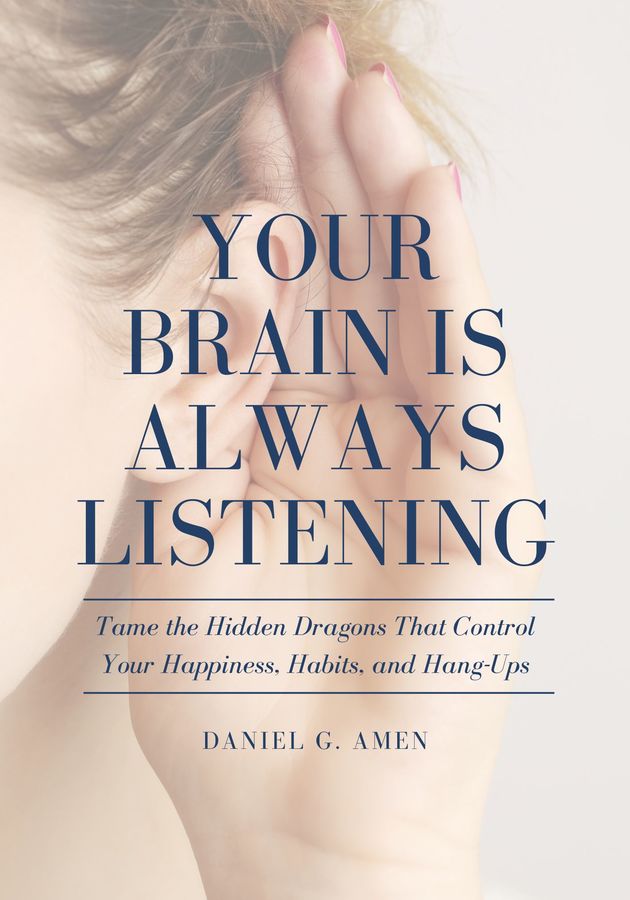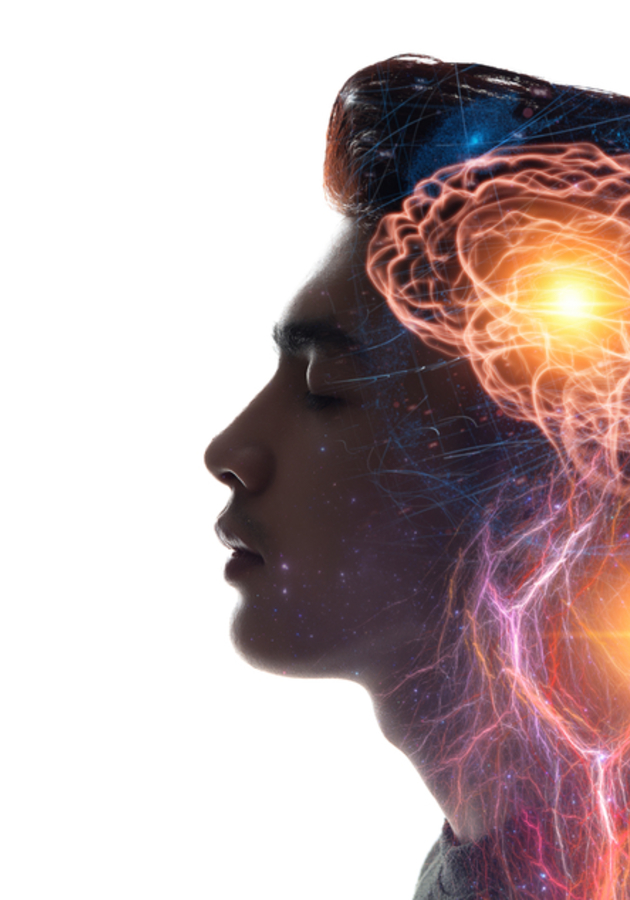“It does not do to leave a leave a dragon out of your calculations, if you live near him,” wrote J. R. R. Tolkien in the 12th chapter of “The Hobbit” titled “Inside Information.” Indeed, argues celebrity doctor Daniel G. Amen, most of our problems in life stem from the fact that we tend to close our eyes to the inner dragons that are constantly breathing fire on our brain. In “Your Brain Is Always Listening,” not only does he show how you can recognize some of these harmful inner dragons but he also gives you the weapons to vanquish them. So, get ready to meet, face to face, the many thought dragons that haunt you and prepare to learn how to overcome them!
Your brain: a very brief primer
According to Christof Koch, chief scientific officer of the Allen Institute for Brain Science, your brain is the most complex object in the known universe. Thereby, any attempt to explain how it works in detail would simply devolve into guesswork. Still, there are some things we know about the brain with enough certainty to help us deal with some illnesses and diseases. For example, we know that when it comes to your “moods, anxieties, memory and behavior,” there are six brain systems that are running the show and doing most of the work. They are:
- The prefrontal cortex (PFC). The PFC is pretty much the boss in your brain, since it plays a major role in all of the executive functions, such as “focus, forethought, judgment, planning, decision making, and impulse control.” When it is low in activity, it is just like the boss went on vacation – namely, there is distractibility, disorganization, procrastination and impulsive behavior.
- The anterior cingulate gyrus (ACG). The ACG deals with error detection. When overactive, it makes one distraught and uneasy, not to mention low on confidence or cynical, as they might see too many errors in themselves or others.
- The amygdala (AMY). Almond-shaped and found underneath the temples, the amygdala is the oldest part of the brain. It is involved in emotion, threat detection and aggression. When overactive, it makes people hypervigilant and socially anxious. When underactive, it makes people too fearless for their own sake.
- Hippocampus (HC). The two hippocampi (which is the Greek word for “seahorses”) are part of your emotional brain and help you feel happy or sad. They are also central to memory. Low activity in the HC results in memory problems. Indeed, it is one of the first areas of the brain that dies in Alzheimer’s disease.
- Basal ganglia (BG). Located deep in the brain, these large structures are involved in habit formation. They also contain the nucleus accumbens (NA) which is the only part of the brain responsive to the feel-good neurotransmitter dopamine. When underactive, the NA makes people depressed and more vulnerable to addictions and cravings.
- Cerebellum (CB). Latin for “little brain.” However, even though the CB is only 10% of the brain’s volume, it contains half of the brain’s neurons and cells. It is involved in many activities, such as “coordination, processing speed, language, cognitive processing, and language.”
Dragons from the Past and Their Dragons
Even from the little we know about the brain, we know for sure that most parts of it are constantly active, even when you’re sleeping or fully focused on a task of a particular type. Consequently, you can’t stop your brain from persistently picking up and responding to many hidden influences, some of which can be fairly negative and harmful, and can sabotage unconsciously both your happiness and health. It is these powerful negative influences that Amen refers to as “the brain dragons.” They can come in many different forms which can be best understood if grouped into six large categories. Let’s have a look at them all, in groups of two.
Dragons from the Past. These are “memories and events that still breathe fire on your emotional centers, driving your behavior long after they’ve passed.” They come in 13 different kinds. For example, they can be Inferior Dragons (which drive feelings of inferiority because you felt “less than” others as a child), Grief Dragons (which show up as a long-term reaction to losing someone important) or Ancestral Dragons (which are your parents’ or grandparents’ issues passed down to you through their genes, behaviors or cultural expectations.) The other 10 types of your inner dragons are:
- Abandoned or Insignificant Dragons. when you feel alone and unseen.
- Anxious Dragons. When you feel fearful or overwhelmed.
- Wounded Dragons. When you are left bruised by a past trauma.
- Should or Shaming Dragons. When you feel racked with guilt.
- Special, Spoiled or Entitled Dragons. When you feel more special than other people.
- Responsible Dragons. When you feel like you need to take care of everything and everyone.
- Angry Dragons. When you harbor hurts and rage inside you and have no control when they take over you.
- Judgmental Dragons. When past injustices have made you more jaded and bitter and now you hold harsh opinions of others.
- Death Dragons. When you fear the future and lack of meaningful life.
- Hopeless and Helpless Dragons. When you feel loss and live in a constant fear of loss.
They, Them, and Other Dragons. Just like yourself, everyone you’ve ever loved or currently love has their own set of dragons, both from their past and their present. These too can attack you, even by mere proxy. Depending on where they come from, these dragons can come in seven self-explanatory types: 1) Parent Dragons; 2) Sibling and Birth Order Dragons; 3) Children Dragons; 4) Teacher and Coach Dragons; 5) Friends, Popular Kids, Bullies, and mean Girls Dragons; 6) Former, Current and Prospective Lover Dragons; and 7) Internet Troll Dragons.
ANTs and Bad Habit Dragons
In addition to the Dragons from the Past and the They Dragons, there are four more monsters that are lurking from the dark abysses of your brain and heart, ready to attack your wellbeing, whether directly or indirectly. Let’s have a look at two of these remaining four – the ANTs and the Bad Habit Dragons.
Automatic Negative Thoughts (ANTs). ANTs are what your inner dragons feed upon. Just like the insect in their acronym, ANTs come in colonies and armies to fuel your feelings of depression, sadness and inadequacy. There are ANTs for each of the 13 dragons that breathe fire on your brain. For example, the All-or-Nothing ANTs – which are around whenever you think in words such as “forever” and “never” – fuel the Judgmental Dragons in your brain, which in turn can make you a condescending moralist. Another example are the Guilt-Beating ANTs which use words such as “ought” or “have to” to fuel the Should and Shaming Dragons that live inside you. Too many Guilt-Beating ANTs and the Should Dragons – which are usually born in a culture of guilt and triggered by disapproval from someone you care about – can puff your brain into distress, submissiveness and even self-harmful behaviors. The other 7 types of ANTs are the following:
- Less-Than ANTs. Fueled by comparison, these are the ANTs that feed the Inferior Dragons which, in turn, make you see yourself as less than others.
- Just-the-Bad ANTs. These ANTs see only the bad in a situation and ignore anything good. Thereby, they give food to all those Hopeless, Ancestral, and Death Dragons inside you.
- Labeling ANTs. Whenever you label yourself or someone else with a negative term, you are allowing your Should, Shaming, or Judgmental Dragons to take over.
- Fortune-Telling ANTs. These ANTs predict the worst possible outcome for a situation with little or no evidence for it. They fuel Anxious, Wounded, Hopeless and Helpless Dragons.
- Mind-Reading ANTs. Believing you know what other people are thinking even though they haven’t told you is just another way to awaken the Abandoned, Invisible, Inferior, and Anxious Dragons from their sleep.
- If-Only and I’ll-Be-Happy-When ANTs. These are the ANTs of regret and yearning, the ones arguing with the past and longing for the future. They fuel all kinds of Dragons, from the Inferior and Anxious ones to the Wounded, Judgmental and Grief Dragons.
- Blaming ANTs. Blaming someone else for your problems is “the first and most devastating hallmark of self-sabotage.” Even though the Blaming ANTs originate with Special, Spoiled, Entitled or Judgmental Dragons, Ancestral Dragons too often come to feed on them.
Bad Habit Dragons. When your Inner Dragon tamer is weak, you are likely to lose control over an inner dragon or two. Nourished by all kinds of ANTs, these dragons then become so powerful that they evolve into a vicious next-level creature: the Bad Habit Dragons (BHDs). There are 10 Bad Habit Dragons: 1) Saying Yes, When You Should Say No BHD, 2) Automatic No or Arguing BHD, 3) Interrupting, No-Filter BHD, 4) Trouble with the Truth BHD, 5) Distracted, Obsessive, Multitasking BHD, 6) Procrastinating (I’ll Do It Tomorrow) BHD, 7) Disorganized BHD, 8) Let’s Have a Problem BHD, 9) Overeating BHD, and 10) Oblivious BHD. To beat a Bad Habit Dragon, you need to identify the triggers that awaken it and discover the rewards it preys upon. The only thing you need to do next is concoct another way to get the same benefit without stirring the dragon in the meantime.
Scheming Dragons and Addicted Dragons
The last two of the monsters that prey upon your wellbeing – that is to say, the powerful negative influences that sabotage your health and happiness – come in another direct/indirect pair. Namely, whereas the Addicted Dragons are the final phase of evolution of your Inner Dragons, the Scheming Dragons are external creatures that can attack you when you are least prepared. But let’s say a word or two about each of the groups.
Scheming Dragons. Even if you find a way to tame all your inner Dragons from the Past, the Scheming Dragons that fly around you will still find a way to assault you. They are everywhere, says Amen, trying to make money off your impulses and primal urges, not caring whether they stir some of your ANTs or directly fuel your Bad Habit Dragons. Of course, we are talking about all those “advertisers, news feeds, social media sites, and the gadgets in your pocket that steal your mind and money.” Generally speaking, there are five great Scheming Dragons: 1) Food Pusher Dragons; 2) Substance and Toxin Pusher Dragons; 3) Digital Dragons; 4) Contact Sports Dragons; and 5) Holiday Dragons. To outfox the Scheming Dragons, always check the message and look past the messenger. In other words, don’t let an influencer or a celebrity fool you – they are just a way for the Scheming Dragon to take hold of you. An even better way is to limit exposure to Scheming Dragons by setting limits on your social media usage and news consumption and by muting and blocking all ads that come your way.
Addicted Dragons. With the help of a few Scheming Dragons, your Bad Habit Dragons – which, as we said, are usually an advanced form of your Dragons from the Past – can evolve into an even more destructive type: the Addicted Dragons. Addictions, as you know full well, aren’t just bad habits, but repetitive behaviors that directly damage your health, wealth, or relationships. Consequently, you can’t fight an Addicted Dragon the way you fight a Bad Habit one – you need much more than a simple switch of a routine. In the opinion of Amen, you need the 12-step program used by Alcoholics Anonymous and similar organizations because they address all four systems of your mental health – the biological, psychological, social, and spiritual.
The Dragon Tamer inside you
“Unless you recognize and redirect all the powerful negative influences in your life,” writes Amen, “they can steal your happiness, damage your relationships, pilfer your health, rob your ability to cope with stress (like the coronavirus pandemic), and limit your destiny. The good news is that once you become aware and tame these dragons and eliminate the ANTs, you can break bad habits, shut down self-defeating thoughts, shore up your capacity to cope with uncertainty, reduce your vulnerability to schemers, and heal addictions. In fact, taming your dragons is essential for good mental health because when they control your brain, your entire life suffers.” But that only begs the question: how do you tame a dragon?
The truth is, it’s not that difficult. Because as sneaky as the Dragons that attack your brain might be, your brain is even sneakier. There is, inside it – more precisely, inside its prefrontal cortex (PFC) – a real-world Dragon Tamer which protects you from impulses, ANTs and Scheming Dragons at all times. This Dragon Tamer, the last part of your brain to develop, is responsible for all kinds of important things, such as overall supervision, goal-setting, persistence, focus, forethought, insight, empathy and conscientiousness. The stronger it is the better. But then again, you must never strengthen your Dragon Tamer to the point that it becomes overcontrolling because then you might become just another micromanager of your Inner Dragons and that’s never a good idea. You shouldn’t live your life in fear: you should live it in control.
The Dragon Tamer is your very own Jiminy Cricket – in its absence, your bad decisions may lead you to utter disaster. So, it’s important to protect your Dragon Tamer. To do this, you must pay attention to several things. Lower blood flow to the brain harms your Dragon Tamer as do inflammations and head traumas. So, exercise your brain as often as possible and avoid activities that could cause you to hit your head often. Your Dragon Tamer gets severely weakened by things such as poor sleep, toxins, obesity and high blood sugar, so avoid not only drugs and alcohol, but also eating too much or sleeping too little. Finally, make sure to surround yourself with loving people and positive mindsets. The Dragon Tamer doesn’t like solitude that much, but it loves company more than anything in the world.
Final notes
While firmly rooted in science, “Your Brain Is Always Listening” still reads as a modern fairytale – and oftentimes, one so simple that can be read to little children with very few alterations. In other words, Daniel G. Amen tries to achieve here precisely what all great popularizers of science should – to explain complex concepts in a way that a 10-year-old would be able to understand. The fact that some of the information is also useful and has practical value is a bonus, not the main point of the book!
12min tip
As Neil Gaiman writes in “Coraline,” “Fairy tales are more than true, not because they tell us that dragons exist, but because they tell us that dragons can be beaten.” True, there are many Dragons inside you, breathing fire on your brain. But there is also a Dragon Tamer. So, don’t be afraid. You are properly equipped to beat almost anything.





























